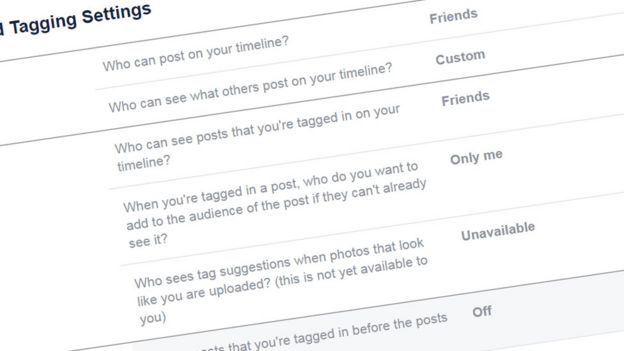
Audio By Carbonatix
Facebook must face a class action lawsuit over its use of facial recognition technology, a California judge has ruled.
The lawsuit alleges that Facebook gathered biometric information without users' explicit consent.
It involves the "tag suggestions" technology, which spots users' friends in uploaded photos. The lawsuit says this breaches Illinois state law.
Facebook said the case had no merit and it would fight it vigorously.
However in his order, US District Judge James Donato wrote: "Facebook seems to believe... statutory damages could amount to billions of dollars."
'Face templates'
On Monday, Judge Donato ruled to certify a class of Facebook users - a key legal hurdle for a class action suit.
In a successful class action suit, any person in that group could be entitled to compensation.
The class of people in question is made up of Facebook users "in Illinois for whom Facebook created and stored a face template after 7 June 2011," according to the court order.
The decision comes days after Facebook chief executive Mark Zuckerberg faced intensive questioning by US lawmakers over the company's collection and use of user data.
He is also due to meet European Commission Vice President Andrus Ansip in San Francisco this week, reports Bloomberg.
What does the facial recognition do?
June 2011 was the date on which Facebook rolled out its "tag suggestions" feature.
The feature suggests who might be present in uploaded photos, based on an existing database of faces.
In Judge Donato's ruling, he laid out the four-step process behind the technology:
- Initially, the software tries to detect any faces in an uploaded photo
- It standardises and aligns them for size and direction
- Then, for each face, Facebook computes a face signature - a mathematical representation of the face in that photo
- Face signatures are then run through a stored database of user face templatesto look for similar matches

On its help pages, Facebook says the face templates are made from information about the similarities in every photo the user has been tagged in.
"If you've never been tagged in a photo on Facebook or have untagged yourself in all photos of you on Facebook, then we do not have this summary information for you," the company says.
The feature is not available to users in most countries, including the UK - and can be turned off in settings for US users.
In December 2017 Facebook announced that users would be notified if a picture of them was uploaded by someone else, even if they hadn't been tagged in it.
Due to privacy regulations, this feature would not be available in Europe or Canada, the firm said at the time.
Latest Stories
-
Nana Aba Anamoah rates Mahama’s performance
3 minutes -
Religious Affairs Minister urges Christians to embrace charity and humility as Lent begins
43 minutes -
Religious Affairs Minister calls for unity as Ramadan begins
44 minutes -
Willie Colón, trombonist who pioneered salsa music, dies aged 75
2 hours -
Guardiola tells team to chill with cocktails as Man City pile pressure on Arsenal
2 hours -
Majority blasts Minority over Burkinabe border bloodbath claims
3 hours -
Analyst says Burkina Faso killings were a calculated signal to Ghana
4 hours -
Veep extends Ramadan greetings, donates to Cape Coast Central Mosque
5 hours -
UBIDS secures $6.6m prefabricated classroom complex to end space deficit
6 hours -
Gold Fields Ghana Foundation deepens childhood cancer awareness drive; invests $4.8m in community health
7 hours -
Iran students stage first large anti-government protests since deadly crackdown
7 hours -
Fire guts Saboba Hospital’s Children Ward
8 hours -
Interior Ministry extends aptitude test dates for WASSCE applicants in 2025/26 security services recruitment
9 hours -
National Investment Bank donates GH₵1m to support GAF barracks redevelopment project
9 hours -
Gomoa-East demolition: 14 suspects remanded by Kasoa Ofaakor Court
10 hours

